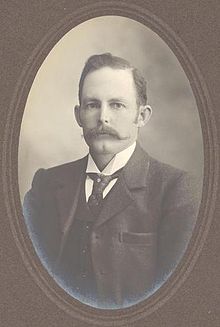John Gratton Wilson
Dr John Gratton Wilson | |
|---|---|
 | |
| Member of the Australian Parliament for Corangamite | |
| In office 16 December 1903 – 13 April 1910 | |
| Preceded by | Chester Manifold |
| Succeeded by | James Scullin |
| Personal details | |
| Born | 18 August 1863 Melbourne, Victoria |
| Died | 20 August 1948 (aged 85) Colac, Victoria, Australia |
| Nationality | Australian |
| Political party | Free Trade (1903–06) Anti-Socialist (1906–09) Liberal (1909–10) |
| Spouse |
Alexandra Frances Symons
(m. 1890–1931) |
| Occupation | Doctor |
John Gratton Wilson (18 August 1863 – 20 August 1948) was an Australian politician. He was a member of the Victorian Legislative Assembly for Villiers and Heytesbury from 1902 to 1903 and a Free Trade Party member of the Australian House of Representatives for Corangamite from 1903 to 1910.
Gratton Wilson was born in Melbourne and educated at the Percy Watkins School in West Melbourne and Wesley College. He studied medicine at the University of London and practised in Somerset, England until 1896, when he returned to Australia, becoming a doctor and farmer at "Farnham Park" near Warrnambool.[1][2] He was the Warrnambool president of the Australian Natives Association, honorary secretary of the Warrnambool Hospital and secretary of a local Patriotic League.[3][4][5][6]
In 1902, he was elected to the Victorian Legislative Assembly for the seat of Villiers and Heytesbury[6] on a platform of "assisting in every practicable way the interests of the dairyman, the agriculturalist and the pastoralist" alongside support for the economic reforms of the Irvine government.[7][8] However, he resigned his state seat, which was about to be abolished in a redistribution, in November 1903 and successfully transferred to federal politics, winning the Australian House of Representatives seat of Corangamite as a member of the Free Trade Party.[9]
In federal parliament, Gratton Wilson described himself as a protectionist but opposed the Protectionist Party due to his hostility towards their more positive relationship with the Labor Party.[10] He thus went into Opposition to Alfred Deakin, but voted against free trade policies.[11] His maiden speech, in March 1904, opposed proposals to increase House sitting days as it would be "too great a tax on businessmen's time".[12][13] He was re-elected in 1906 but was defeated in 1910 by future Labor Prime Minister James Scullin.[1][2] He attributed his defeat to "apathy and treachery" by anti-Labor supporters who thought he would win and did not assist him in the face of a strong Labor campaign and "misrepresentations and misunderstandings".[14]
He served in World War I from 1916 to 1919 as a member of the Army Medical Corps, after which he returned to his Warrnambool medical practice and farm. He retired in 1920 and later moved to "Iluka" at Moonlight Head (later Yuulong) near Cape Otway. His Yuulong home was destroyed in bushfires in 1934, though he was still residing in the area in 1939 when he made a donation of 375 ferns to the Wombat Hill Botanic Gardens.[15] He died at Colac, Victoria in 1948, aged 85.[1][2][16][6]
References
[edit]- ^ a b c Carr, Adam (2008). "Australian Election Archive". Psephos, Adam Carr's Election Archive. Archived from the original on 17 July 2007. Retrieved 14 June 2008.
- ^ a b c "OBITUARY". The Argus (Melbourne). No. 31, 814. Victoria, Australia. 19 August 1948. p. 5. Retrieved 13 May 2022 – via Trove.
- ^ "COUNTRY NEWS". The Argus (Melbourne). No. 17, 505. Victoria, Australia. 20 August 1902. p. 6. Retrieved 13 May 2022 – via Trove.
- ^ "WARRNAMROOL". The Argus (Melbourne). No. 17, 521. Victoria, Australia. 8 September 1902. p. 6. Retrieved 13 May 2022 – via Trove.
- ^ "WARRNAMBOOL". The Argus (Melbourne). No. 16, 759. Victoria, Australia. 24 March 1900. p. 11. Retrieved 13 May 2022 – via Trove.
- ^ a b c "John Gratton Wilson". Re-Member: a database of all Victorian MPs since 1851. Parliament of Victoria. Archived from the original on 23 April 2023. Retrieved 13 May 2022.
- ^ "VILLIERS AND HEYTESBURY SLECTORATE". Hamilton Spectator. No. 6494. Victoria, Australia. 18 September 1902. p. 4. Retrieved 13 May 2022 – via Trove.
- ^ "THE GENERAL ELECTION". The Argus (Melbourne). No. 17, 542. Victoria, Australia. 2 October 1902. p. 7. Retrieved 13 May 2022 – via Trove.
- ^ "CORANGAMITE". The Age. No. 15, 182. Victoria, Australia. 5 November 1903. p. 5. Retrieved 13 May 2022 – via Trove.
- ^ "No title". The Age. No. 15, 223. Victoria, Australia. 23 December 1903. p. 6. Retrieved 13 May 2022 – via Trove.
- ^ "The Federal Elections". Kalgoorlie Western Argus. Vol. IX, no. 470. Western Australia. 22 December 1903. p. 33. Retrieved 13 May 2022 – via Trove.
- ^ "HOUSE OF REPRESENTATIVES". The Argus (Melbourne). No. 17, 984. Victoria, Australia. 4 March 1904. p. 5. Retrieved 13 May 2022 – via Trove.
- ^ "CORANGAMITE". The Age. No. 15, 209. Victoria, Australia. 7 December 1903. p. 5. Retrieved 13 May 2022 – via Trove.
- ^ "CORANGAMITE EIECTION". Camperdown Chronicle. Vol. XXXVI, no. 5697. Victoria, Australia. 23 April 1910. p. 3. Retrieved 13 May 2022 – via Trove.
- ^ "FAMILIES SURROUNDED BY BUSHFIRES". The Herald. No. 17, 704. Victoria, Australia. 10 February 1934. p. 1. Retrieved 13 May 2022 – via Trove.
- ^ "WARRNAMBOOL NOTES". Table Talk. No. 3179. Victoria, Australia. 11 April 1929. p. 75. Retrieved 13 May 2022 – via Trove.
- Free Trade Party members of the Parliament of Australia
- Commonwealth Liberal Party members of the Parliament of Australia
- Members of the Australian House of Representatives for Corangamite
- Members of the Australian House of Representatives
- Members of the Victorian Legislative Assembly
- Victoria (state) state politicians
- 1863 births
- 1948 deaths
- People from the Colony of Victoria
- Australian MPs 1903–1906
- Australian MPs 1906–1910
